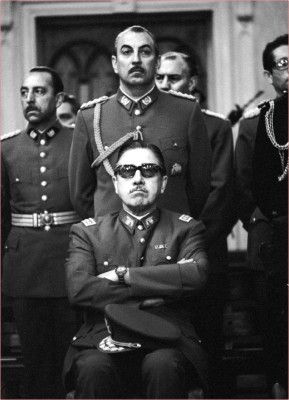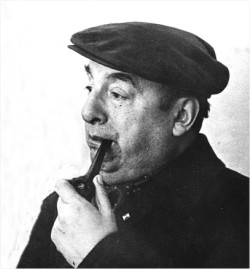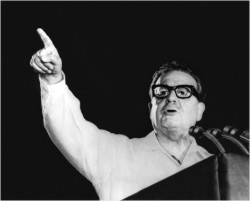
Inside
|
September 11, 1973
Thirty four years ago, darkness descended on Chile. In the early hours of September 11, 1973, the country's armed forces led by the army chief, General Augusto Pinochet Ugarte, went into action to overthrow the democratically elected government of President Salvador Allende Gossens.
In 1970, as indications of an Allende triumph increasingly manifested themselves, Chile's rightwing elements, in good company with the American administration of President Richard Nixon, went to work to undermine the election or, if that was not possible, to steal the election. In the event, Allende was elected to office with just 36.2 percent of the votes. The day was September 4, 1970. Once he was certain that he had been elected president, Salvador Allende, who had earlier made several attempts to gain the office, told his ecstatic supporters: "Entrare a la Moneda y conmigo entrara el pueblo. Sere el Companero Presidente" -- he would enter La Moneda, the presidential palace, in the company of the people, for he was going to be their president. It was, as Ariel Dorfman was to note later, the moment of baptism for Allende as Chile's leader. And yet, for all the enthusiasm that greeted the socialist politician's electoral victory, things of a portentous nature were already beginning to be felt. The Nixon administration, through Henry Kissinger, had not given up its goal of creating problems for the new Chilean government. The Central Intelligence Agency went into the job of organising people against Allende, through recruiting agents in Santiago, and pumping in money to elements ready and willing to destabilise the administration. Alongside that went propaganda against the Allende government's "attempts" to turn democratic Chile into a fortress of Marxism. President Allende warded off all such attempts bravely, through drawing attention to the US-led campaign against the people of Chile and through employing all diplomatic means to explain to the outside world that democracy under the Marxists was safe in his country. He sent the young and articulate Orlando Letelier to Washington as ambassador, in the hope that Letelier would be able to explain to the Americans the causes behind the nationalisation program that had been launched in Santiago. To Paris, as ambassador, went the eminent poet Pablo Neruda. None of these moves stopped the Nixon administration and the rightists in Chile from carrying on with their campaign to overthrow the Allende government. Increased funding by the CIA only reinforced the resolve of Allende's enemies to force him from office. Steps were also taken to influence the Chilean military into moving against the government. They did not work, and would not work, till nearly the very end of the administration. Meanwhile, a strategy of economic destabilisation was worked out by the US government and its agents in Santiago. Trade unions were drawn into the anti-Allende camp, to a point where truck drivers put a brake on all their activities and brought transport movement to a halt all across the country. As all of this went on, the wives of Chile's military officers took the unprecedented step of confronting the army chief, General Carlos Prats, and berating him over his "failure" to take action to "save" the nation. Their target was, of course, President Allende. It was an incident that left Prats deeply disturbed. As paralysis took hold of the country, Prats resigned on August 22, 1973. He was replaced the next day by General Augusto Pinochet, considered an Allende loyalist. That sentiment would soon turn out to be the biggest irony for Chileans, for no sooner had Pinochet taken control of the army than he went into the business of planning the coup against Allende. Over the next eighteen days, Pinochet and his fellow officers in the air force and the police swiftly went into working out the details of the plan to overthrow the president. Secrecy was maintained in the absolute sense of the meaning. As the military and the CIA finalised their plans to depose the government, President Allende waged a desperate struggle to keep his government together. Already rumours were in the air about an impending coup. The government, however, was in little position to put its finger on what precisely was happening. The first moves toward the coup were taken at 4 a.m. on September 11, when various military units in the capital and other cities in Chile gathered to voice their support for the leaders of the coup. As Chile slept, soldiers went into action in the cities of Concepcion and Valparaiso. Before daybreak, the two cities went under the absolute control of the military.
The air force systematically strafed the palace and hit its targets with precision. By 9 a.m. Santiago passed into the hands of the army, units of which fanned out to various parts of the city. A half hour later, President Allende made what would turn out to be his final broadcast to the nation. He promised defiance and pledged to fight on to uphold constitutional government in Chile. Sometime later, he appeared on the balcony of La Moneda, an AK-47 in his hands and a helmet on his head. Moments later, he went back in. It was the last the world would see of Salvador Allende. By early afternoon, he was dead. One of his aides, who had managed to escape from the presidential palace, would later tell the world that he had seen Allende place his gun between his feet and, as he ran from the place, had looked back to see the president's skull fly off from his head. The man added, though, that he had heard no gunshot. His report was widely ridiculed. The more accepted version of how Allende met his end came from other sources, who pointed out that soldiers had stormed into La Moneda and stabbed and shot the president to death. After an autopsy that really was not, Allende's body was buried in his ancestral village. However, no stone or any other sign marked his grave. The coup leaders wanted no trace to be left of the dead president. Allende was sixty five when his life came to an end. In the days following the coup, terror took over Chile. Thousands of people were rounded up by the soldiers and detained in the local stadium. Many of them were murdered. Officially, the number of those who died from the excesses of the military regime was 3,192. Many more simply disappeared. Hundreds of Chileans, many of them prominent citizens, went into exile in neighbouring countries and in Europe. Carlos Prats left the country and moved on to Argentina. Orlando Letelier, the former envoy who was Allende's last defence minister, had been seized on the morning of the coup and tortured over the next twelve months before being freed and allowed to leave Chile. He would eventually make his way to the United States. The poet Pablo Neruda, ailing at the time of the coup, would be dishonoured by soldiers ransacking his home. Within days of the coup, he would die. The popular singer Victor Jara, a vocal supporter of the Allende government, was picked up by the army and murdered in the very Santiago stadium where he had once roused his fans to ecstasy with his music.
The Pinochet dictatorship kept tight control over Chile till 1990, when General Pinochet left office, albeit after ensuring immunity for himself and his men over the 1973 coup and the subsequent measures taken by his regime. In his later years, Pinochet became a target of human rights groups around the world and, at one point, was arrested in London upon a warrant issued by a Spanish court. Eventually allowed to go back home by the British government, he saw a resurgent Chilean democracy strip him of his immunity and charge him with human rights violations during his years as dictator. He died, aged 91, in December 2006. Chile is today governed by President Michelle Bachelet, who as a young woman was subjected to torture by the army after the coup in 1973. Her mother, too, went through similar repression. Her father, a senior air force officer and Allende loyalist, was tortured to death by soldiers soon after the coup. Syed Badrul Ahsan is Editor, Current Affairs, The Daily Star. |
 In the three years preceding the coup, the government, the first socialist administration elected to office through popular support, had run into a series of problems that left Allende and his team reeling. And the fault for the mismanagement, indeed the chaos, that defined Chile since Allende's election lay not with him but with those who had actively conspired to keep him from being elected.
In the three years preceding the coup, the government, the first socialist administration elected to office through popular support, had run into a series of problems that left Allende and his team reeling. And the fault for the mismanagement, indeed the chaos, that defined Chile since Allende's election lay not with him but with those who had actively conspired to keep him from being elected.  In Santiago, at 6.20, President Allende was awakened with the news that a coup led by his new army chief was in progress. Within the following hour, the military, by now rapidly moving to gain control of the city and planning to seize the Moneda presidential palace, sent a message to Allende, offering to let him leave the country. The president spurned the offer.
In Santiago, at 6.20, President Allende was awakened with the news that a coup led by his new army chief was in progress. Within the following hour, the military, by now rapidly moving to gain control of the city and planning to seize the Moneda presidential palace, sent a message to Allende, offering to let him leave the country. The president spurned the offer.  Salvador Allende's widow would make her way out of Chile. The dead president's cousin, the writer Isabel Allende, too, would leave the country and settle abroad. The Pinochet regime, having put a brutal system in place, would not, however, rest until it had dealt with its enemies, real or assumed. Agents of the Chilean intelligence organisation, DINA, murdered General Carlos Prats and his wife by blowing up their car in Buenos Aires, Argentina, on September 30, 1974. Two years later, on September 21, 1976, Orlando Letelier, busy marshalling support for Chilean democrats in the United States, was blown up in Washington by DINA agents acting with assistance from their American friends.
Salvador Allende's widow would make her way out of Chile. The dead president's cousin, the writer Isabel Allende, too, would leave the country and settle abroad. The Pinochet regime, having put a brutal system in place, would not, however, rest until it had dealt with its enemies, real or assumed. Agents of the Chilean intelligence organisation, DINA, murdered General Carlos Prats and his wife by blowing up their car in Buenos Aires, Argentina, on September 30, 1974. Two years later, on September 21, 1976, Orlando Letelier, busy marshalling support for Chilean democrats in the United States, was blown up in Washington by DINA agents acting with assistance from their American friends.